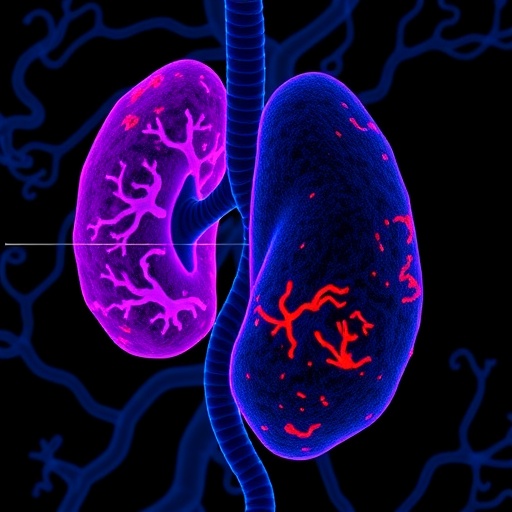In a groundbreaking study set to redefine the therapeutic landscape of clear cell renal cell carcinoma (ccRCC), researchers have illuminated how MLN4924—a potent small molecule inhibitor—exerts its tumor-suppressive effects by stabilizing nuclear FBP1, a critical metabolic regulator within cancer cells. This revelation uncovers a sophisticated regulatory axis that not only curbs tumor metabolism but also halts aggressive tumor growth, offering fresh hope for targeted interventions against one of the most stubborn forms of kidney cancer.
Clear cell renal cell carcinoma, the predominant subtype of kidney cancer, notoriously exhibits a reprogrammed metabolic profile that empowers malignant cells with survival advantages under hypoxic and nutrient-scarce conditions. The adaptive metabolic circuitry enables these cells to fuel proliferation and evade apoptosis, contributing to treatment resistance. Central to these metabolic adaptations is the dysregulation of enzymes involved in carbohydrate metabolism, among which Fructose-1,6-bisphosphatase 1 (FBP1) has emerged as a pivotal yet underexplored player.
FBP1, conventionally known as a gluconeogenic enzyme catalyzing the hydrolysis of fructose-1,6-bisphosphate to fructose-6-phosphate, has garnered attention for its non-canonical tumor suppressor functions located within the nuclear compartment. Nuclear FBP1 disrupts glycolytic flux and attenuates hypoxia-inducible factor (HIF) activity, thereby impeding metabolic pathways vital for cancer cell survival. However, in ccRCC, nuclear FBP1 is often destabilized or underexpressed, facilitating unchecked metabolic reprogramming and tumor progression.
Through meticulous in vitro and in vivo analyses, the researchers demonstrated that MLN4924 treatment leads to significant preservation of nuclear FBP1 levels. This stabilization suppresses glycolytic flux by limiting fructose-1,6-bisphosphate availability for downstream glycolytic enzymes, effectively starving cancer cells of rapid energy sources. Concurrently, by restoring FBP1’s nuclear functions, MLN4924 impairs HIF1α-mediated transcriptional programs that promote angiogenesis and adaptation to hypoxia, further debilitating tumor progression.
The metabolic consequences of FBP1 stabilization extend beyond glycolysis inhibition. The study reveals that MLN4924 disrupts the metabolic plasticity of ccRCC cells by constraining glutamine metabolism and mitochondrial respiration, suggesting a broad-spectrum metabolic blockade. This obstruction curtails biosynthetic pathways essential for sustaining rapid tumor growth and prevents metabolic compensation mechanisms often observed in therapy-resistant cancer cells.
The molecular mechanisms underlying MLN4924-mediated FBP1 stabilization involve interference with cullin-RING E3 ubiquitin ligase complexes (CRLs), whose neddylation status dictates their activity. By inhibiting NAE, MLN4924 impairs CRL-mediated ubiquitination of FBP1, thereby preventing its proteasomal degradation. This post-translational control underscores the delicate balance cancer cells maintain in regulating key metabolic enzymes and highlights vulnerabilities exploitable for therapeutic gain.
Beyond its primary findings, the research contributes to an evolving narrative that challenges the traditional view of metabolic enzymes as mere metabolic catalysts. Instead, these enzymes exhibit multifunctional roles within the nucleus, including chromatin remodeling and transcriptional regulation. By stabilizing nuclear FBP1, MLN4924 effectively reinstates these tumor-suppressive nuclear functions, representing a novel paradigm in targeting cancer metabolism.
Additionally, this study opens avenues for combinatorial strategies, where MLN4924 could synergize with existing agents such as tyrosine kinase inhibitors or immune checkpoint blockers, enhancing anti-tumor efficacy. By disrupting the metabolic lifelines of ccRCC cells, MLN4924 may sensitize tumors to other modalities, overcoming resistance and prolonging patient survival.
The translational implications are profound, given the current clinical challenges in managing advanced ccRCC, where therapeutic resistance and metabolic adaptability limit durable responses. Targeting the neddylation pathway with MLN4924 not only disrupts tumor metabolism but simultaneously modulates the tumor microenvironment, potentially resetting the immunological milieu to favor tumor clearance.
Future investigations are warranted to delineate the full spectrum of MLN4924’s targets and its effects on metabolic and epigenetic landscapes, as well as to identify biomarkers predictive of response. Understanding how nuclear FBP1 interacts with other nuclear proteins upon MLN4924 treatment could unveil additional tumor suppression mechanisms and liabilities.
Furthermore, this research exemplifies the power of integrating metabolic biology with targeted therapeutics, advancing our grasp of cancer as a multifaceted systemic disease. By exploiting metabolic vulnerabilities and post-translational modifications, novel treatment strategies can be designed that transcend conventional approaches focusing solely on oncogenic signaling pathways.
Clinicians and researchers alike will find this study a valuable resource, presenting a compelling case for incorporating metabolism-targeted therapies into the clinical arsenal against ccRCC. The potential to stabilize a key tumor suppressor enzyme through precisely targeted molecular interventions sets a new benchmark in personalized oncology.
As the oncology community anticipates clinical trials, the hope is that MLN4924 or related agents will soon transition from bench to bedside, offering patients with ccRCC an effective and less toxic therapeutic option. The prospect of metabolically reprogramming tumors to restore their own suppressive mechanisms is a conceptual leap that redefines how we approach cancer treatment in the 21st century.
This work not only charts a promising therapeutic course but also underscores the profound complexity and plasticity of cancer metabolism—an arena ripe for exploitation. With continued research and clinical validation, targeting nuclear FBP1 stabilization through neddylation inhibition could represent a cornerstone in conquering metabolic diseases like ccRCC, ultimately improving outcomes and quality of life for countless patients worldwide.
Subject of Research: The study investigates the effect of MLN4924 on tumor metabolism and growth in clear cell renal cell carcinoma (ccRCC) by stabilizing nuclear FBP1.
Article Title: MLN4924 suppresses tumor metabolism and growth of clear cell renal cell carcinoma by stabilizing nuclear FBP1.
Article References:
Yang, Y., Ma, Y., Fan, S. et al. MLN4924 suppresses tumor metabolism and growth of clear cell renal cell carcinoma by stabilizing nuclear FBP1. Cell Death Discov. 11, 253 (2025). https://doi.org/10.1038/s41420-025-02426-8
Image Credits: AI Generated
DOI: https://doi.org/10.1038/s41420-025-02426-8
Tags: 6-bisphosphatase 1 rolecancer treatment resistance mechanismsclear cell renal cell carcinoma therapyFBP1 stabilizing agentsFructose-1glycolytic flux disruption in ccRCChypoxia and cancer cell survivalmetabolic reprogramming in cancerMLN4924 renal cancer treatmentsmall molecule inhibitors in oncologytargeted interventions for kidney cancertumor metabolism regulationtumor suppressor functions of FBP1





